Algae Biofuel & Biomolecules Centre
Introduction:Price hike of petroleum products and its imminent depletion in sight have forced a serious thought on the alternative sources of energy. While coal can satisfy electricity demand for many years, the CO2 output nails it to dust. Wind is the cheapest but cannot be harnessed everywhere. Varying with weather; wind, tide and solar energy need to be converted to a storage form. Hydrogen is considered the answer but technology development needs time, while batteries cannot run heavy machinery and airplanes. While most of the sources of river based hydel energy have been tapped, option of nuclear energy is fraught with insecurities and India would need ~150-175 nuclear reactors to meet targeted 25% of the total energy demand by 2050.
Biological alternatives include alcohol, biodiesel, biogas, hydrogen and electricity through microbial fuel cells. Last two technologies are not ripe. Alcohol production depends on available sugars. Use of sucrose is easier and cheaper than starch than the cellulosic and lignocellulosic molecules. Alcohol can run the vehicles but the energy output is pretty less than biodiesel. Biogas is the cleanest of them all but other than energy, oil derived products are part of our daily lives today. Unfortunately biological alternatives encroach other fast diminishing resources, namely land and freshwater, which in turn affect availability of food. Land and freshwater demand though comparatively less, would be there for most of the other sources of energy as well.
Considering this Algae Biofuel & Biomolecules Centre (ABBC) was established in lines of Section 5 (d) of the University Act by the Board of Management of the Maharshi Dayanand Saraswati University Ajmer vide Decision No. 12 dtd 28.8.2010 and Order No. F 13 () Acad-I/MDSU/2011/10532-70 dtd. 3.3.11. The ABBC is an interdisciplinary Research and Outreach Program involving 9 faculty members from Microbiology, Environmental Science, Food Science & Nutrition, Economics and Management.
Algae, a group of microscopic plants are known for Agar agar, Agarose, Kelp, Algin, Alginate, Carrageenan, Xanthophyll, Blue Green Algal Biofertilizers, production of fish-feed and food/feed supplements as Spirulina and Chlorella and Wastewater remediation, yet their potential for biofuel and bioenergy production is untapped. Rajasthan with ample of sunlight and long hours of sunshine is ideal for the cultivation of algae. Therefore ABBC was established to conduct research and develop technologies for cheaper cultivation of algae as the feedstock for biofuel, bioenergy and biomolecules in a biorefinery mode and generate workforce for >700 venture capital enterprises based on algae.
It has following functions:
- Research and technology development and demonstration
- Research collaborations
- Information dissemination
- Capability Building
Throughout the world there is an acute scarcity of persons trained in algae. The Centre proposes to begin a PG course in Biofuel & Bioenergy or in Microbiology with specialization on algae biofuel as soon as the faculty is inducted for Fermentation (Methane and Alcohols), Lignocellulose hydrolysis, Fuel Cell, Lipid transformation to biodiesel and biodiesel qualities, Biofuel crops and their cultivation.
Aims and goals
The ABBC aims to develop and disseminate economically feasible technology for biofuel production through algae and generate skilled manpower with a larger goal to wheel India’s economic growth through carbon dioxide-neutral biofuels without using freshwater and arable land and simultaneously reducing its pollution load.
Objectives
To meet the above stated aims and goals following objectives are set:
- Technology development for algae biodiesel production
- Technology development for alternate algae biofuels production
- Capability Building (HRD & Information dissemination)
- Technology development for the production of other biomolecules from the spent algal biomass
- Technology demonstration and environmental impact assessment
- Feasibility assessment
- Technology dissemination, IPR & Human resource requirement assessment
Facilities developed worth ~ 20 lakhs
- Algae Cultivation Trial and Demonstration Area: 16 x 22 m fenced area with three trenches and small tray (1 x 1.5 ft) systems for solid surface and floating cultivations. Area is sufficiently big to put up Pilot Scale Mass cultivation Systems
- Heavy duty Cooling Centrifuge
- Oxitop BOD System with incubator
- 62” x 28” x 14” fibersheet solid surface and raceway type cultivation system prototypes (3 each)
- Titrolineautotitration system
- Automatic 6 place solvent extraction system
- Weather station
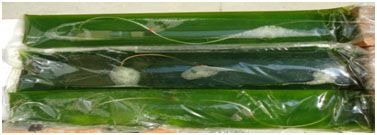
Cultivation of algae in polybags
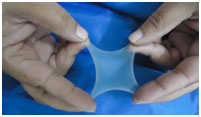
Algal biopolymer based membrane for wound dressing
Associated faculty and students published 3 (Journal Impact Factor Thompson Reuter > 2.3, One chapter in Wiley book presented 11 Papers/Poster papers in international/national conferences/seminar/workshop, 10 Discussion papers presented in Workshop and 5 Invited Lectures. 22 M.Sc. students were guided for their research projects
Ongoing Major Research Project
|
Title |
PI |
Name of the Funding Agency (if any) |
Amount sanctioned |
Remarks, if any |
|
Moist bioactive cellulose biocomposites for advanced wound care |
Monica Bhatnagar |
Parenteral Drug Association India Chapter |
Rs. 50 lakh |
March 2018 to March 2023 (5 years) |
Development of technology for farmers
Associated faculty and students published 2(Average Thompson Reuter Journal Impact Factor 2.39)and presented 5 Papers/Poster papers in international/national conferences/seminar/workshopand 2 Invited Lectures. 30 M.Sc. students were guided for their research projects
Research Project completed (in collaboration with other institutes):
|
Title |
Project Coordinator |
PIs |
Name of the Funding Agency (if any) |
Amount sanctioned |
Duration |
|
Development of Low Water Demanding Cultivation System for Algae of Rajasthan |
Ashish Bhatnagar |
MDS University Ajmer: Ashish Bhatnagar, Monica Bhatnagar, Central University of Rajasthan: Pavan Dadheech |
Department of Biotechnology, Government of India |
Rs. 46.45 lakh |
1.5 years |
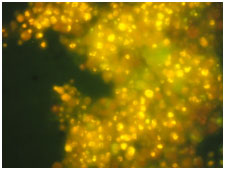
Chlorella sp. viewed by Fluorescence Microscope after Nile Red staining (400X)
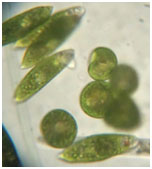
Euglenasp.in water samples viewed by Bright Field upright microscope (400X)
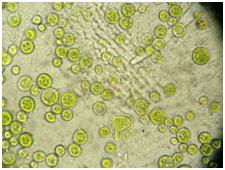
Chlorococcumsp. in water samples viewed by Bright Field upright microscope (400X)
Faculty submitted 7 Project proposals for funding
Capability Building
Teaching (Skill development): Two courses have been introduced as electives in M.Sc. Microbiology program of learning under Choice Based Credit System. They are:
- MIC 433 Energy and Alternative Energy (1L) and
- MIC 427 Sk Biofuel & Bioenergy (3L+2P)
Conducted workshop on Algae Cultivation and Biofuel Production (26-31 July 2013).Resource persons were fromUN’s International Centre for Genetic Engineering and Biotechnology, New Delhi, IIT Bombay and IIT Kharagpur, IARI, New Delhi, CSIR emeritus scientist, University of Rajasthan, Central University of Rajasthan, Birla Institute of Scientific Research and MDS University Ajmer. 26 scientists, scholars and teachers participated and were represented by National Institute of Technology Durgapur and Hamirpur, National Botanical Research Institute, Lucknow, Gujarat Vidyapeeth, Universities of Madras, Karnataka, Gujarat, Rajasthan and Mumbai and colleges of Madhya Pradesh and Rajasthan. Thirty four students also participated in the Workshop.
Two day workshop was held on Small Enterprise in Microbiology on 15-16 February 2016 to impart training on the importance and cultivation of Azolla, Blue Green Algae Biofertilizer, Spirulina and Vermicomposting. Resource persons were from Krishi Vigyaan Kendra, Tabiji, IARI, New Delhi; and North Maharashtra University, Jalgaon. Out of 85 participants, 39 were rural youth representing 13 districts of Rajasthan, 8 were teachers, 5 research scholars, 1 retired agricultural officer, 1 medical officer and students of the university.
Lent academic collaboration on the sub-themes Energy Entrepreneurship, Entrepreneurship in Alternative and New Energy, Entrepreneurship in Energy Conservation and Algaepreneursfor4th Biennial International Conference onEntrepreneurship, Tourism, Environment and Energyorganised by the Centre for ESBM at MDS University Ajmer was held on 11-12 October 2014. Total Fourteen papers were accepted for presentation in the sub theme ‘energy’.
Organized One Day Seminar on 12.8.2017 on Awareness towards Biofuels 195 participants attended including children and faculty from the Central Academy School, Ajmer sponsored by National Yuva Cooperative Society New Delhi, Indian Oil, Bharat Gas and Hidustan Petroleum
Recognition/Academic laurels of the faculty associated with ABBC:
- Best Paper Award 2013Third Prize is awarded by the International Journal of Molecular Science for the research paper “Senthil Chinnasamy, Balasubramanian Ramakrishnan, Ashish Bhatnagar and Keshav C. Das.Biomass Production Potential of a Wastewater Alga Chlorella vulgaris ARC 1 under Elevated Levels ofCO2 and Temperature. Int. J. Mol. Sci. 2009, 10, 518-532; doi:10.3390/ijms10020518”. This paper was co-authored by Dr. Ashish Bhatnagar. (In: Ophelia Han 2013. International Journal of Molecular Science Best Paper Award 2013 Int. J. Mol. Sci. 2013, 14, 4372-4374; doi:10.3390/ijms14024372)
- US Patent granted on the work done by Dr. Ashish Bhatnagar during 2008-09 (prior to the establishment of Algae Biofuel & Biomolecule Centre) at The University of Georgia, Athens USA: May 13, 2014: Patent No. US 8,722,389 B1, Method and System of Culturing an Algal Mat: KC Das, BR Cannon, A Bhatnagar and S. Chinnasamy.
Faculty reviewed papers related to the Centres theme in7 international journals (all with journal impact factor more than 1.0 and 2 Indian Journals
Research Collaborations
Academic collaborations with
- Prof. KC Das Biorefining and Carbon Cycling Program of the University of Georgia, Athens USA for reactor design improvement as well as for development of technologies towards cost reduction. Partnership is envisaged on thermoliquefaction, pyrolysis and gasification of algae biomass.
- Dr. M. Krishnamohan, Biotechnology Division, Birla Institute for Scientific Research, Jaipur for studies and conservation of algal and cyanobacterial diversity of Rajasthan, a joint project has been submitted to DST Rajasthan.
- Prof. D.W. Dhar and Dr. S. Pabbi, Microbiology Division, IARI, New Delhi and Dr. Sharon Velasquez Orta of New Castle University (UK). Joint project was submitted to but could not materialize.
- Dr. Susmita Dutta Department of Chemical Engineering, National Institute of Technology, Mahatma Gandhi Avenue, Durgapur on biosorbent preparation for wastewater remediation from used algal biomass
- Dr. JhumaGanguly Department of Chemistry, Indian Institute of Engineering, Science & Technology, Shibpur, Howrah, WB, India for Structural analysis of the exopolysaccharides
- Senthil Chinnasamy ofAban Infrastructure Ltd. Chennai and Dr. B. Ramakrishnan Microbiology Division for various aspects of algae cultivation
- Dr. Pavan Dadheech Department of Microbiology, Central University of Rajasthan, Bandarsindari on Feasible Mass Cultivation of Algae as Biofuel Feedstock in Rajasthan(Interventions: Nutrient Supply, Water demand and spent biomass utilization)[BT/PR13275/PBD/26/464/2015]
